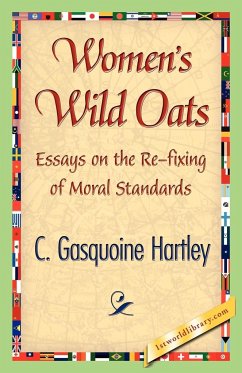
Women's Wild Oats

PAYBACK Punkte
8 °P sammeln!
The sudden collapse of the war left us in a daze. After the years of inhuman strain it was hard to ease off tension to the almost forgotten conditions of peace. I recall that ever to be remembered day, November 11th, 1918-Victory Day. In the early hours before noon I was in London, and my young son was with me. Everywhere was an atmosphere of anxiety, an unusual stillness. Men in little groups of two and three stood here and there, soldiers in larger numbers loitered or walked slowly along the pavements; girls and women waited at the doors of business houses and shops, where inside nobody seem...
The sudden collapse of the war left us in a daze. After the years of inhuman strain it was hard to ease off tension to the almost forgotten conditions of peace. I recall that ever to be remembered day, November 11th, 1918-Victory Day. In the early hours before noon I was in London, and my young son was with me. Everywhere was an atmosphere of anxiety, an unusual stillness. Men in little groups of two and three stood here and there, soldiers in larger numbers loitered or walked slowly along the pavements; girls and women waited at the doors of business houses and shops, where inside nobody seemed attending to the few customers. Everyone was waiting; there was an expectancy so great and so stirring that ordinary life had stopped. The last hour seemed endless in its slow passing.














